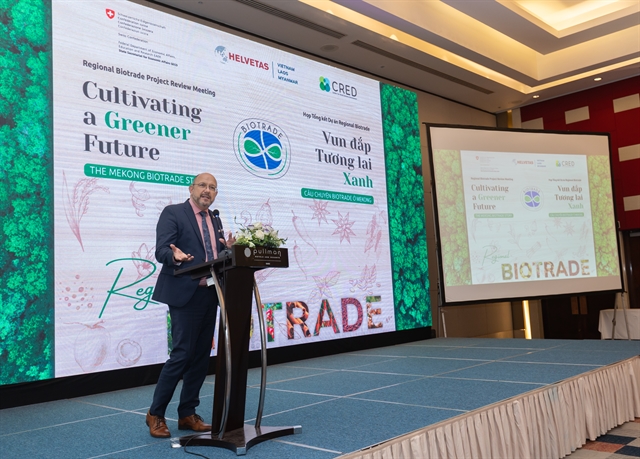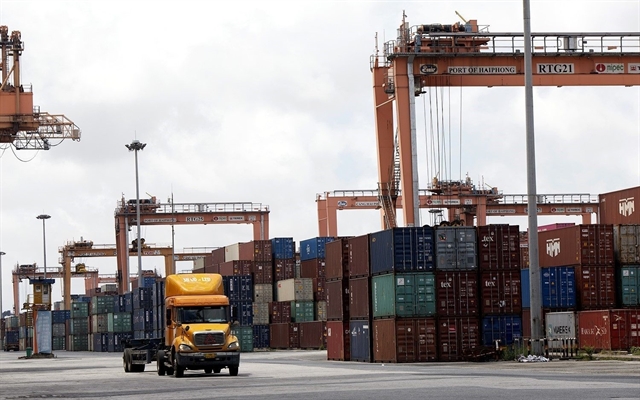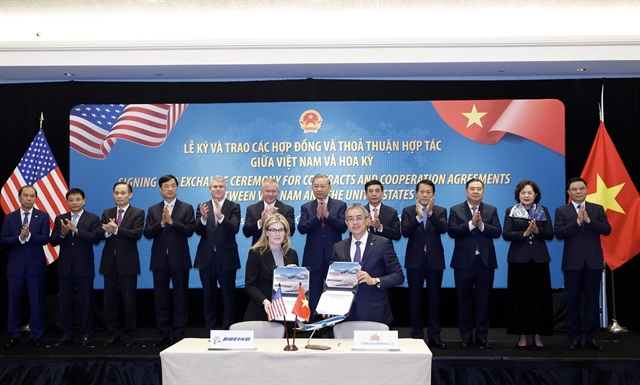 Society
Society


|
| Swiss Ambassador Thomas Gass. |
HÀ NỘI — Representatives from local small and medium enterprises, who benefited from the technical assistance from an NGO in the Mekong Delta, went to see it being officially wrapped up by the Swiss Embassy.
The project, Biotrade, managed by the Swiss agency Helvetas, a centre for rural economic development, a local NGO, helped smaller businesses over the past eight years.
"Eight years ago, we started out with strong presence of Myanmar companies, but after eight years, Vietnamese companies really caught up and arrived successfully," Swiss Ambassador Thomas Gass told Việt Nam News at the event.
Titled, 'Cultivating a Greener Future', the event reviewed the success of the regional project that spanned five countries including Việt Nam, Myanmar, Laos and Cambodia, to conserve biodiversity through sustainable trade in biodiversity-based products.
Bringing in benefits for over 50,000 people, income for mostly ethnic women in rural and remote areas, it also created new jobs and improved their working conditions.
Endowed with CHF8,5 million in 2016, (nearly US$10 million) investment over two four-year phases and with Cambodia joining in only from second phase, the project ended with accumulated trade volume up to $161 million, with more than 50 companies getting involved. "It is really a remarkable achievement," the Ambassador told the press in both English and French at the meeting.
Biotrade is an economic model leveraging the strength of ethical international trade, ethical consumption trends, and encourage equitable economic growth to reduce poverty, yet preserving local biodiversity. The key approach of this model is to connect local exporters of bio-diversity-based products to global market chains. Starting out with the biodiversity product of Shan tea in Myanmar, eight years later the list of products grew to include non-timber forest products, spices and agricultural products that construct local agro-ecosystems.
Participating companies needed to comply with Voluntary Sustainability Standards of Union for Ethical Biotrade on ethical sourcing and facilitating their participation in international trade fairs.
From the tea at the beginning, today the number of ethically-sourced value chains is 32, including tea, cinnamon, cashews, benzoin and other bio-diversity-based products. Biotrade helped usher many enterprises in Việt Nam, where an accumulated number of 46,000 stakeholders benefited, with more than half of them being women living in remote areas.
Biotrade helped small and medium enterprises turn their limited assets into strength by providing technical assistance to focus on their biodiversity-based products to get into niche markets and thrive.
In the case of cinammon in Việt Nam, Yên Bái Province government authorities implemented a subsidy, a direct payment to companies to gear farmers from conventional growing methods towards organic, following a policy dialogue initiated by the Biotrade project.
Since the project spanned through the COVID years of 2020 until 2022, the impact it brought to local people and companies has been truly remarkable.
Among the other companies helped by the Biotrade project, DACE, a Vietnamese business in the spice industry, started operations with a clear vision and ambitious goals to bring Vietnamese spices to global markets, which are full of opportunities and challenges.
DACE decided to build a sustainable raw material area and comply with organic standards, taking it from there. DACE has been provided with sustainable development, taking part in training programmes and using market research to get to know global consumer trends. It got approved EU organic certification in 2018 which opened the doors to European markets for its spices.
In 2020, DACE exported products to the United States for the first time, having obtained USDA certification. Subsequently, the company expanded its export operations, increasing its customer base and export value in the organic goods market.
DACE even got involved deeper with certain market requirements, such as the German market, which requires Naturland certification—a certification that combines organic production standards with sustainable elements and biodiversity—which became the next target. Access to the German organic market through Biotrade's trade promotion support, including participation in the BioFach organic fair and connections with major German organic distributors Chado and Soul Spice, has reinforced DACE's determination to succeed.
In early 2023, DACE became one of the first Vietnamese businesses in the spice industry to achieve Naturland certification.
DACE has seen its raw material area significantly grow, expanding from 75 hectares with 254 farmer households in 2017, to 2,300 hectares and 3,014 farmer households in 2024. Trần Văn Hiếu, CEO of DACE, said: "The Biotrade project has provided substantial support to DACE in developing our capabilities and promoting the company's sustainable growth. This assistance has been instrumental in achieving an annual growth rate of at least 20 per cent over the past seven years.
"DACE products are present in the majority of the world's major organic agricultural product consumer markets, including the EU, Japan, the UK, the USA, Australia and others particularly within specialised organic product chains."
At the project closing event, Ambassador Grass stressed that it meant that: "The purpose of international development cooperation is no longer needed". That local people can function on their own knowing how to preserve biodiversity of their community, while local companies now have the passport to global consumer markets and cater to practice ethically sourced agricultural biodiversity-based products.
Last April, Director of the Swiss Federal Office for Agriculture (FOAG) Christan Hofer met with Việt Nam Prime Minister Phạm Minh Chính at the 4th global conference of the One Planet Network's Sustainable Food Systems Programme (SFS Programme), confirming both sides commitment to facilitate trade while improving local livelihoods and preserving biodiversity.
Over the past 30 years, Switzerland through the Swiss Agency for Development and Cooperation (SDC) began to help improve local livelihoods by helping farmers with crop techniques. In the early 2000s, Switzerland helped farmers to get better access to markets for agricultural produce, which then included tea, cinnamon and star anise.
At the event, Ambassador Grass emphasised once again the importance to protect biodiversity, the fundamental requirement for everyone to thrive on and live in harmony with surrounding nature.
By creating trade to bring ethically-sourced products to where they can be sold to consumers, people who produced them get paid, creating jobs, making their lives better.
Ambassador Grass also highlighted the ongoing negotiations of a Free Trade Agreement (FTA) between Việt Nam and the European Free Trade Association (EFTA), hoping that once concluded, this FTA will further expand the market for Biotrade products, creating even more opportunities for businesses and partners.
The Biotrade project may closed for the time being, but its impact shall continue to expand to other communities and people, who also need to develop their communities in a sustainable way to preserve biodiversity for everyone on earth to thrive on. — VNS




